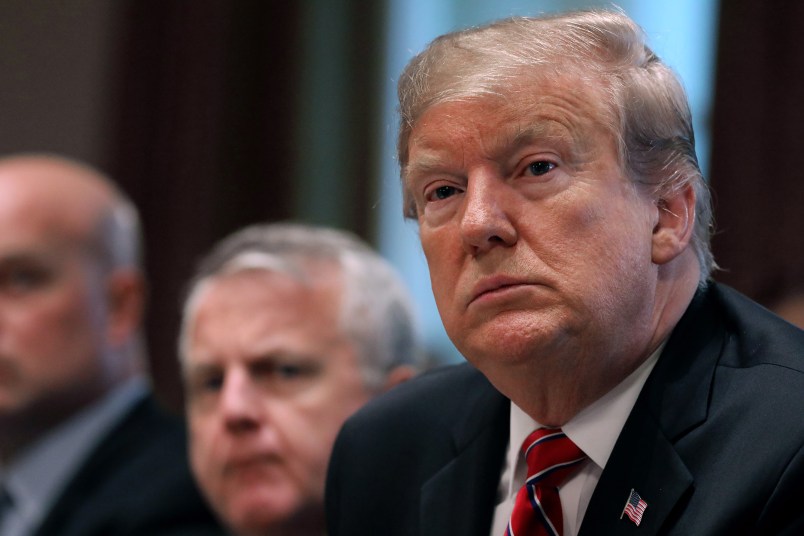President Trump’s repeated efforts to meddle with Justice Department investigations into him and his inner circle included a phone call to then acting Attorney General Matt Whitaker asking for an ally to be put in charge of the Michael Cohen probe, the New York Times reported Tuesday.
The report lays out several previously unknown episodes showcasing the private attempts by Trump and his supporters to impede the Cohen investigation as well as special counsel Robert Mueller’s Russia probe.
According to the Times, the phone call to Whitaker happened in late 2018. Trump asked Whitaker if Geoffrey Berman, the Trump-aligned U.S. attorney in Manhattan who is recused from the Cohen probe, could be put back in charge, the Times reported.
The Times said it had not found direct evidence that Whitaker had directly intervened in the investigation. The paper reported that Whitaker concluded that Berman could not be put back in control of the investigation, currently being led by a career prosecutor at the U.S. attorney’s office, since he had already recused.
However, the Times report also says that Whitaker had claimed in private conversations with associates that his DOJ role was to “jump on a grenade” for the President. After his call with the president, he reportedly told some colleagues that the prosecutors in Manhattan needed some “adult supervision.”
The Justice Department and the White House declined to comment to the New York Times for the report, while Whitaker referred the Times’ inquiries to the Justice Department.
Trump was asked about his reported request regarding Berman’s recusal by the White House pool Tuesday.
“No, I don’t know who gave you that,” he said.
Even before the Times report, Democrats in Congress had floated the possibility that Whitaker may have misled them in testimony earlier this month. Whitaker at a House Judiciary Committee hearing denied previous reports that Trump had “lashed out” at him over the Cohen probe, and also denied that Trump had reached out to express dissatisfaction about the investigation. He refused to answer a question about whether he had spoken to Trump more broadly about the Cohen investigation.
A statement released by the Justice Department after the New York Times report was published said that Whitaker, who has remained at the Department after Attorney General Bill Barr was confirmed, stood by his testimony.
The full statement, attributable to @KerriKupecDOJ: pic.twitter.com/lmZ5WGomJL
— Ryan J. Reilly (@ryanjreilly) February 19, 2019
The Whitaker phone call is just one of many episodes of attempted interference highlighted in Tuesday’s New York Times report.
Trump also discussed the Cohen probe with Deputy Attorney General Rod Rosenstein, and after the April FBI raid, the President recounted to associates that Rosenstein had told him that the probe wasn’t aimed at the President since it was focused on Cohen’s business dealings, the Times reported. Trump has since wondered to associates whether that assurance was just an attempt by Rosenstein to calm him down, according to the Times.
But even earlier, from when the Russia investigation first started gaining traction, Trump and his allies engaged in private interference attempts that tracked with his public bashing of Mueller.
When scrutiny grew over White House’s handling of false claims about ex-National Security Advisor Mike Flynn’s contacts with Russians, Trump told his to tell the media that the President himself asked for Flynn’s resignation, according to the report. Trump appeared to get the idea from comments then-Speaker Paul Ryan made, quoted to him by an advisor, indicating that it was Trump’s decision, according to the Times.
But the fallout continued. According to the Times, when then White House press secretary Sean Spicer stepped in front of the media to explain the resignation decision, his comments to the press were so error-laden, that White House lawyers compiled a memo of all the false things Spicer said. The record was never publicly corrected by the White House.
Trump had thought firing Flynn, and later former FBI Director James Comey, would end the pressure of the Russia probe. But those moves only exacerbated it, with the appointment of Mueller after Comey’s firing. Trump turned his ire towards his Attorney General Jeff Sesssion, who was recused from the investigations.
While he ultimately did not oust Sessions — very publicly, by Tweet —until November 2018, during the summer of 2017 Trump repeatedly sought to privately push him out. He even asked his former campaign chairman Corey Lewandowski, to pressure Sessions to resign, the Times reported, adding that Lewandowski did not act on the request.






